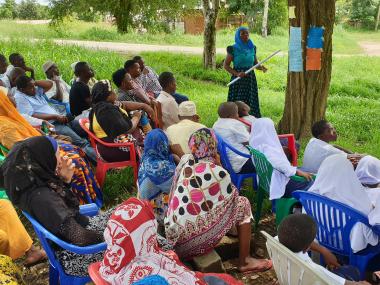Ensuring Organizational Accountability Through PRRP

As part of the efforts to ensure accountability, ActionAid Tanzania (AATZ) recently conducted the 2018 annual national level participatory review and reflection process (PRRP) in Dar-es-Salaam.
The Annual National level PRRP event, which sums up a process that started at community and district levels in February, brought together staff, board members, CSO representatives, partner organisations and media personnel.
PRRP is ActionAid’s in-built system intended to ensure organizational accountability to people living in poverty AATZ works with, partners and stakeholders at various levels and supporters/donors. It is also used to bring together staff, communities, partners and stakeholders to jointly review achievements and failures and reflect upon challenges and lessons for the future.
The first PRRP was conducted mid 2018 and focused on reviewing progress in implementing the annual plan, as an input for any needed adjustments for the remaining period of the year.
Specifically, the national reflection event is aimed at reviewing the organization’s annual performance, capturing impacts of AATZ’s work and agreeing on subsequent year plan of action. The process also serves as a forum to capture voices of communities, partners and stakeholders concerning the organization’s performance and behaviour as inputs for future programming.
Welcoming participants to the annual PRRP event, AATZ Country Director Yaekob Metena said,
“We are very thankful for all of you for coming to this annual participatory review and reflection process. This is our accountability mechanism in which we present ourselves to be questioned, critiqued and advised for what we have done. It is at the centre of our accountability hence not an option but a must.''
During the event, ActionAid presented the 2018 implementation report depicting achievements, challenges and lessons learnt, to enlighten participants who were not directly involved in the implementation of the programmes for them to be able to relate on the impacts, what has been done and was followed by reflections and discussions in small groups.
Apart from presentations, participants also had a gallery walk to learn more about AATZ work from the staff through explanations and pictorial presentation posted on walls.
Community representatives from Mafia, Pemba, Kilwa, Unguja, Tandahimba and Chamwino shared their testimonies on the impact of AATZ’s 2018 interventions in their areas. Mussa from Pemba said:
"I am one of the youth beneficiaries of AATZ intervention in Pemba. We have been trained on tax justices, accountability and leadership. We used the knowledge to raise awareness to other community members through radio programmes, engaging decision makers on key issues around tax collection and how it’s being used. Through these programmes, our knowledge, skills and confidence have also increased. This led us to get an idea and formed our organisation known as Pemba Youth Organisation for sustainability of our work after AATZ phases out."
Mariam Cheheni from Tandahimba added: "Women of Tandahimba are no longer like before. They are now aware of their rights and how to defend themselves. Early pregnancies are now being reported to the authorities because of awareness from AATZ."
ActionAid Tanzania board members who took part in the reflection also appreciated the organisation for coming up with the reflection session and they were amazed by the community representatives’ testimonies about the impact of AATZ’s work. “I don’t know what to say... I am overwhelmed by the testimonies from community representatives,” said Dr Azaveli Lwaitama.

On recommendations, participants advised AATZ to scale-up their activities instead of continuing to concentrate on the same places, more capacity building to partners, creating systems at community level which are also linked to respective government departments so that even when AATZ leaves the place it will be very easy for community and government to sustain the activities.
From the district level PRRPs (Kilwa, Chamwino, Singida, Unguja, Pemba Mafia and Tandahimba) where the same kind of event took place, district government officials appreciated AATZ for the great work of empowering citizens to take part in the development processes. They advised AATZ to share their plans with district departments, so that they can be included in the comprehensive district plans to avoid duplication of efforts and involvement of government during designing and implementation of projects to ensure its sustainability even after AATZ phases out.
More than seven hundred (700) participants from community, district and national level including men, women and children took part in the process and shared their views and opinions on AATZ work.
Among key lessons drawn from the process includes: If women, youth and children are well organised and involved in interventions, they become active agents of change in the communities.